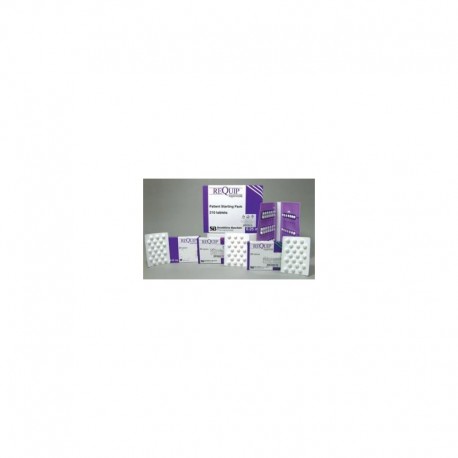No products
 View larger
View larger Requip 2 Mg 21 Tablets ingredient Ropinirole
RQ7812D
New product
| Quantity | Discount | You Save |
|---|---|---|
| 2 | 5% | Up to $2.79 |
| 3 | 10% | Up to $8.37 |
| 4 | 15% | Up to $16.74 |
| 5 | 20% | Up to $27.90 |
Requip 2 Mg 21 Tablets ingredient Ropinirole
• If you have other questions, please talk your doctor or pharmacist.
490 Items
Volume discounts
| Quantity | Price | You Save |
|---|---|---|
| 2 | $32.00 | Up to $2.56 |
| 3 | $32.00 | Up to $7.68 |
| 4 | $32.00 | Up to $15.36 |
| 5 | $32.00 | Up to $25.60 |
More info
4.6. Pregnancy and lactation
General advice:
Pregnancy category: C.
Women with childbearing potential / Contraception:
There is not enough data on the use of ropinirole in pregnant women.
Animal studies are insufficient in terms of effects on pregnancy, embryonal / fetal development, birth or postnatal development (see section 5.3 Preclinical safety data). The potential risk for humans is unknown.
Pregnancy: It
is not recommended to use REQUIP XL during pregnancy unless the potential benefit to the mother outweighs the potential risk to the fetus (see section 5.3 Preclinical safety data).
Lactation period:
REQUIP XL should not be used in nursing mothers since it may inhibit lactation.
Reproductive ability / Fertility:
4.7. Effects onon the effects of
ability to drive and use machines No data is availableropinirole on vehicle and machine use.
Patients should be cautioned about the use of vehicles and machines due to somnolence and dizziness (including vertigo) when using REQUIP XL.
8.4. Adverse effects
, as well as vehicle or machine
Adverse effects, are listed in the table below. The overall safety profile of ropinirole includes adverse reactions from clinical trial data and post-marketing experience.
Adverse effects are listed according to organ systems and their frequency. Frequencies are very common (> 1/10), widespread (> 1/100 and <1/10), non-prevalent (> 1 / 1.000 and <1/100), infrequent (> 1 / 10.000 and <1 / 1,000) , very rare (<1 / 10,000) and unknown (unpredictable).
Clinical Trial Data
Adverse Drug Reactions Reported in Parkinson's Patients
Unless indicated otherwise, the following data were observed with both immediate release and extended release formulations.
Use in monotherapy studies
Psychiatric disorders
Common: Hallucinations
Nervous system disorders
Very common: Somnolans, syncope1
Common: Dizziness (including vertigo)
Vascular disorders
Uncommon: Postural hypotension2, Hypotension2
Gastrointestinal disorders
Very common: Nausea
Common: Abdominal pain1, vomiting1, dyspepsia1, constipation2
General disorders and place of application
Very common: Peripheral edema (including edema in the limbs)
Use in additional treatment studies
Psychiatric disorders
Common: Hallucinations, confusion1
Nervous system disorders
Very common: Dyskinesia
Common: Somnolans2, dizziness (including vertigo)
Vascular disorders
Common: Postural hypotension2 , Hypotension2
Gastrointestinal disorders
Common: Nausea, constipation2
General disorders and place of application
Very common: Peripheral edema2Post
Rapid release clinical trial data
2 Extended release clinical trial data-
marketing I
Psychiatric disorders
Uncommon: Psychoticincludingincluding delusion, paranoia and delirium
reactions (hallucinations). Impulsive control symptoms, increased libido including hypersexuality, pathological gambling (see section 4.4 Special warnings and precautions for use)
Nervous system disorders
Very rare: excessive somnolence, sudden falling asleep *
* As in other dopaminergic therapies, during post-marketing experience, Extremely somnolence and sudden sleepiness have been reported rarely in Parkinson's disease.
Patients who fall asleep suddenly cannot resist sleep suppression and may not remember their fatigue before they fall asleep. When the data were evaluated, it was observed that all cases improved when the drug dose was reduced or discontinued. In most of these cases, patients also used drugs with potential sedation properties.
Vascular disorders
Common: Hypotension, postural hypotension
4.9. Overdose and treatment The
symptoms of overdose of ropinirole are usually related to the dopaminergic activity of the drug. These symptoms can be alleviated by appropriate treatment with neuroleptics or dopamine antagonists such as metoclopramide.

